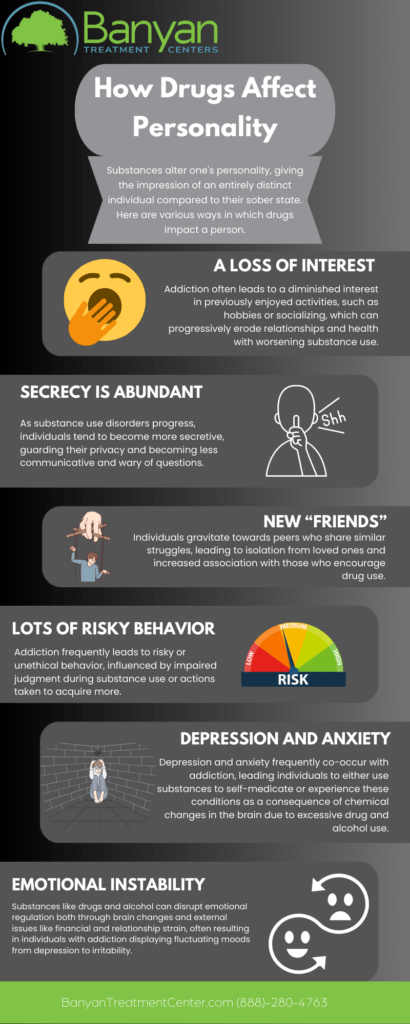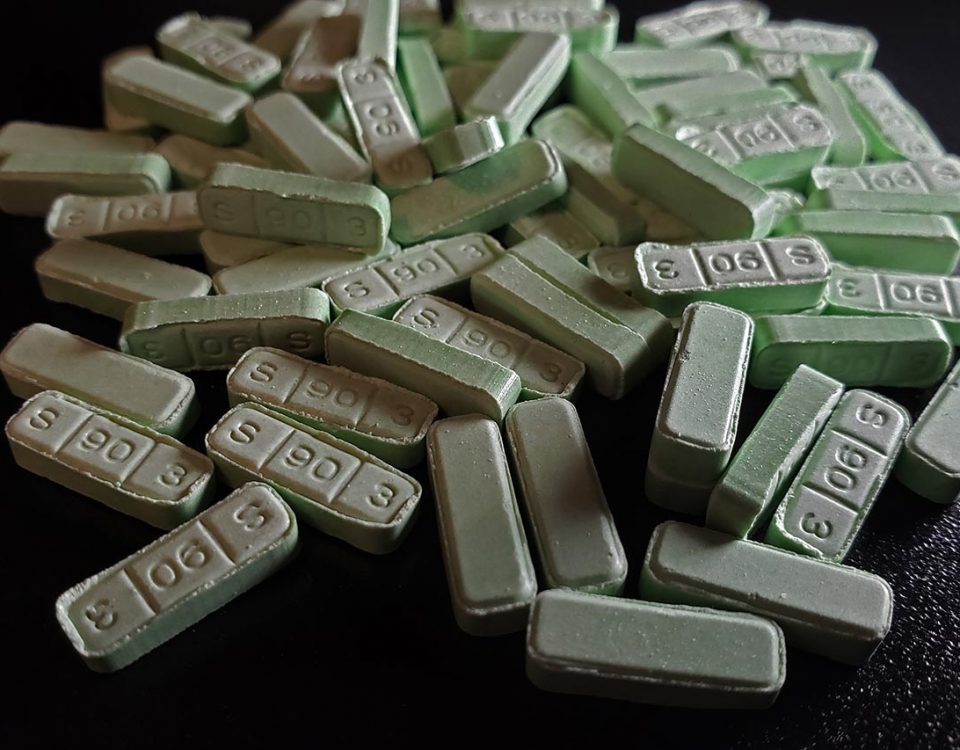A drug or alcohol addiction can have a major impact on a person’s life in many ways. This can range from their physical health to their relationships with loved ones. Many individuals who do not get help for their substance use disorders will often struggle with separation, divorce, debt, and even homelessness. All these changes, however, start in the brain. Drugs and alcohol can impact the brain greatly, impairing its ability to properly balance neurotransmitters and even changing its structure. In the end, these changes can impact a person’s body and character. Today we are asking: how do drugs affect personality, and how can we catch these changes in time to help an individual recover?
Can Drugs Change Your Personality?
Yes, drugs change personality, making an individual seem like a completely different person from who they are when they are sober. Below are several ways drugs influence a person's emotions, perceptions, and behavior.
They lost interest in things they used to enjoy
One of the primary characteristics of addiction is a loss of interest in things the individual once enjoyed. Whether the individual was an avid golfer, loved to paint, or simply enjoyed spending time with friends and family, these things gradually lose ground when drugs and alcohol become involved. As you can imagine, this can damage the individual’s relationships and health as their substance use worsens.
They become secretive
People with substance use disorders also become more secretive as their drug or alcohol use progresses. They do what they can to protect their privacy, becoming less talkative and suspicious or defensive when people ask them questions. They may also be wary of others trying to get information from them. As a result, they may spend more time by themselves.
There are several reasons why an addict becomes secretive. First, they are often aware that their loved ones would disapprove of their drug or alcohol use. Naturally, friends and family may try to persuade the individual to stop and get help. Second, the individual may be using illegal drugs or illegally obtaining controlled substances, which can lead to legal problems as well as problems within their social circles.
They become depressed or anxious
Depression and anxiety are common types of mental illness that often co-occur with addiction. Otherwise referred to as co-occurring disorders, a person with depression and/or anxiety may turn to drugs or alcohol to self-medicate and cope with their symptoms. On the other hand, depression and anxiety may result from the chemical and structural changes that may occur in the brain because of excessive drug and alcohol use.
For instance, alcohol relaxes the central nervous system by enhancing the effects of the inhibitory neurotransmitter GABA and diminishing the effects of the excitatory neurotransmitter glutamate. To compensate for this change, the brain may produce more glutamate and less GABA, which can lead to anxiety and agitation when the person is sober. Anxiety can also be caused by a preoccupation with having access to drugs or alcohol, and depression can result from the realization of the damage to the person’s habit.
They become emotionally unstable
Drugs and alcohol can not only impact emotional regulation through chemical and structural changes in the brain but also because of other troubles they can cause, such as financial and relationship problems. For these reasons, it is common for people who struggle with addiction to also exhibit many mood swings, ranging from depressive moods to short tempers.
This is especially true if you are standing between an addict and their substance. Oftentimes, the more loved ones try to help, the more short-tempered the individual will become. The thought of being sober can be terrifying to someone whose life has become centered on drinking or getting high.
In terms of physical change, brain imaging studies have shown that long-term substance abuse weakens the brain’s prefrontal cortex and its connections to other regions of the brain. The prefrontal cortex is associated with functions like self-control, attention, planning, and emotional regulation. Considering this, it’s understandable why someone with a drug or alcohol problem may struggle with emotional regulation and be more prone to mood swings and outbursts.
They start hanging out with different friends
It’s common for people who become addicted to drugs and alcohol to surround themselves with others who are, as well. Not only would you start pushing your loved ones away, but you might also spend more time with people who will help you obtain drugs and alcohol or encourage your substance use. It is easy to keep doing something that is not good for you when you are surrounded by people who encourage it.
They engage in risky behavior
Addiction often contributes to risky or unethical behavior, either due to impaired judgment while high or drunk or due to actions committed while attempting to obtain more drugs or alcohol. As we previously mentioned, long-term addiction can impact the prefrontal cortex, which is associated with various functions, including self-control and planning. Individuals with addictions are, therefore, more likely to engage in risky behaviors without considering the consequences.
People who are dependent on drugs and alcohol may also turn to criminal activity to get their fix, which can lead to legal troubles. Drugs can also lower your inhibitions, increasing the risk of engaging in behaviors like sharing needles with other users or having unprotected sex.
Additional drug addict personality traits to look out for include a decline in personal hygiene and self-care, an inability to self-regulate their emotions, and obsessive or compulsive behavior. Physical changes are also common in individuals with drug or alcohol problems, including extreme fluctuations in weight, reduced oral health, and skin problems.
Drugs That Cause Personality Changes

More case studies have surfaced regarding how drugs affect personality, many of which involve prescription medications. For instance, one diabetic patient – referred to as Patient Five – who was in his late 50s started taking a statin to lower his cholesterol. Soon after he began the treatment, the once reasonable man became angry and explosive and was particularly prone to road rage.
His road rage was so severe, in fact, that he had warned his family to stay away from him, as he was worried he might put them in the hospital. Afterward, he avoided driving himself anywhere. Even as a passenger, his wife would have to turn around and go back home because of his road rage.
Eventually, Patient Five realized these changes took place after he started this new medication. Two weeks after he stopped taking it, he got his personality back.1
Over the years, Beatrice Golomb, who leads a research group at the University of California, San Diego, has collected reports from patients across the U.S. These include tales of broken marriages, destroyed careers, and a surprising number of men who were unnervingly close to murdering their wives.
In almost every case, symptoms began when the men started taking statins, then promptly returned to normal once their medication was stopped. However, one man repeated this on-and-off-again cycle five times before he realized the connection.2
According to Golomb, most patients from these case studies struggled to recognize the changes in their behavior in connection with their new medications. In some instances, this realization came too late, as various individuals took their own lives due to drug-related personality changes.3
Alongside illegal drugs like cocaine, methamphetamine, heroin, and LSD, others that affect personality include:
- Acetaminophen (paracetamol)
- Antihistamines
- Statins
- Asthma medications
- Antidepressants
Scarily enough, these medications are among the most commonly prescribed in the world, let alone in the United States.
Addiction Recovery Care at Banyan
Substance abuse can cause much trouble for the individual and their loved ones. One decision can lead to a lifetime of problems. Understanding how drugs affect personality can better prepare you to be there for a loved one. If you or someone you care about has developed a drug or alcohol problem, do not wait to get help.
Our nationwide addiction treatment facilities offer various levels of care to support patients in their recovery, including medically supervised detox, inpatient treatment, and outpatient services. Banyan rehab locations also provide various addiction therapy programs, including the widely used cognitive behavioral therapy (CBT).
For more information about our addiction treatment services and how we can support long-term sobriety, call Banyan Treatment Centers today at 888-280-4763 or send us your contact information, and an admissions specialist will reach out to you.
Sources:




















